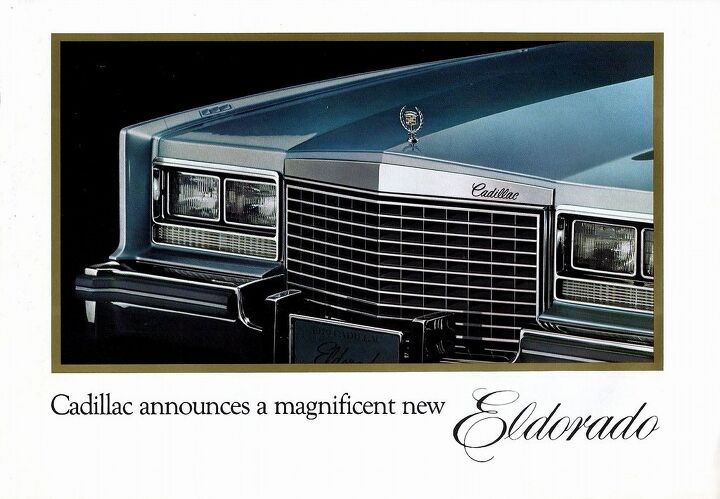
In our last entry, Cadillac waved a tearful goodbye to the full-size Eldorado at the conclusion of 1978. The model lasted two additional years after the rest of the Cadillac lineup was downsized for 1977, as GM prepared to modernize the E-body platform that dated to 1966. The ninth generation had a very successful run that began in 1971, and improved its sales figure steadily throughout its tenure. But a new automotive world was dawning at the end of the Seventies, and the Eldorado needed to change to stay competitive. Let’s dive into automotive market context.

By 1979, the U.S. automotive market had endured the OPEC crisis, increases in gasoline prices generally, fuel economy pressures from consumers, and increased competition from efficient and reliable Japanese cars. Emissions regulations increasingly demanded engines spew a lower volume of toxic chemicals from their exhausts. The consumer base was also changing.
The Greatest Generation born between 1901 and 1927 was aging out of the car buying populace. Those who remembered the glamorous sweeping fenders and heavy running boards of early 20th century automobiles were no longer the majority. In their place was a relatively smaller Silent Generation and their children, the subsequent generation of adults that really began to sway market trends. The era of the Baby Boomer consumer had arrived.

Born between 1946 and 1964, young Boomers were more into sporty cars and European vibes than they were the baroque personal luxury coupes and brocaded sedans of the Seventies. European manufacturers in particular became a real threat to domestic brands by the latter part of the Seventies. The percentage of imported vehicles into the US in 1970 was 1.4 percent of the total market. That figure rose to 21 percent in 1979.
The likes of Mercedes-Benz, Porsche, BMW (and later Audi) increased their presence on the US market via their sophisticated styling and handling, and their imported prestige. This was particularly desirable to a subset of the Boomers known as Yuppies from the early Eighties through the mid-Nineties. They had upwardly mobile incomes and sporty European tastes. It was this type of customer who became the fixation of domestic manufacturers, particularly General Motors.

For about three and a half decades, General Motors chased the younger and younger-affluent customer who was much more likely to be an import car buyer. GM felt it was essential to maintain market share by swaying them from a foreign vehicle into one of many General Motors offerings. The first evidence in Cadillac product differentiation arrived in 1976 with the launch of the hugely successful Seville midsize sedan. Contrary to selling a car by inches, pounds, and displacement, the Seville was smaller, less powerful, and more expensive. And it worked.

Shortly thereafter Cadillac gained Touring as a sporty trim in 1982 for the Eldorado, introduced the compact economical Cimarron in 1983, and in 1988 invented the Allanté convertible to take on the Mercedes SL. Later, Cadillac would ditch its traditional naming for a three-letter nomenclature to feel more European: DTS, DHS, STS, SLS, ETC, and etc.

Oldsmobiles wore “International Series” badging with multinational flags for real European appeal and gained a top-spec Touring trim similar to Cadillac. Chevrolet launched the Eurosport trim, combining GM’s two hot topics together into one word. Pontiac initiated the sporty STE trim, and created a 6000 sedan with all-wheel drive to compete with the Germans.
Even Buick got in on the action with its sporty T-type offerings and monochromatic GS trims. Eventually GM took the ultimate step, and created a whole brand just to compete with economic imports for youthful customers when it created Saturn. And lest we forget the Japanese imports GM marketed itself under the Geo brand, and later as Chevrolet.

This context was brewing when the new for ‘79 tenth generation Eldorado was launched. Downsized in all dimensions and with over 900 pounds in weight trimmed, the Eldorado rode on a revised E-body platform. Alongside new (and very similar looking) options in the sixth generation Buick Riviera and third generation Oldsmobile Toronado, two of the three cars (Eldorado and Toronado) now wore the same sheet metal for the first time.

The Riviera was front-wheel drive for the first time ever. Each car was largely differentiated via trim, engines, and front and rear clip adjustments. On each car there was a visible seam front and rear where the ends would be changed to create the brand-specific appearance. For a customer who wanted the individual personal luxury coupe from General Motors in 1979, the Riviera was the way to go.
The new tenth generation Eldorado was the only new vehicle at Cadillac showrooms that year, contrary to prior product alignment strategy that saw the entire lineup renewed at once. The model portfolio in 1979 included the Seville midsize sedan, DeVille coupe and sedan, Fleetwood Brougham sedan, the Fleetwood Limousine, and Fleetwood Formal Limousine. The new Eldorado was placed into the lineup at roughly price parity to the flagship midsize Seville sedan

Aside from the obvious downsizing and styling changes, there were many changes under the skin of the 1979 Eldorado. While some of them were for the better, this particular model was the beginning of a “try new electronic things” era at Cadillac, which didn’t go particularly well. We’ll get into the details in our next installment.
[Images: General Motors]
Become a TTAC insider. the latest news, features, TTAC takes, and everything else that gets to the truth about cars first by subscribing to our newsletter.


